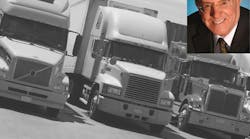Las Vegas. Steve Forbes, chairman and editor-in-chief for Forbes Media, shared his views on the current economic state of the nation at the opening general session of the Truckload Carriers Association (TCA) 75thannual convention here in Las Vegas today. His post-election presentation spared neither Democrats nor Republicans as he discussed the causes and cures for what Forbes dubbed “the new abnormal.”
“We should be growing much faster,” he told the overflowing crowd of conference attendees. “In the past, sharp downturns have been followed by sharp upturns. Why not this time?”
According to Forbes, the tepid recovery is “the result of bad policy decisions,” which have created headwinds for the nation’s economy rather than filling its sails. He outlined four of those decisions: bad monetary policy, taxes and the tax code, unnecessary and burdensome regulations and the so-called health care “crisis.”
We have an economy with basic strengths, Forbes noted, but the central bank has been printing too much money. “Money works best with a fixed value,” he said, “like weights and measures or time. What the Federal Reserve is doing now is suppressing interest rates. The result is that there is less credit available to unincorporated businesses…They are trashing the value of the dollar, and a weak dollar equals a weak recovery.”
The result, according to Forbes, is an economy that is not functioning the way that it should. People are reluctant to invest when they don’t know what they’ll get back in return, he explained. “Bad things happen when you do this. The housing bubble never would have happened, if they did not print too much money.”
Part of the solution, Forbes said, is to re-fix the value of the dollar to gold again, something he believes will eventually happen. The federal debt is going on $17 trillion, he noted in response to a question from the audience. How do you bring that down? Fix the value of the dollar to gold---call it $1,500 per ounce. Then it becomes relatively easy to make interest rate and other adjustments to that fixed value. If people can see a future, the value of assets goes up. If you are growing the asset side of the equation, then the liabilities side becomes “less fearsome.”
“Another headwind is taxes. People in the United States and most other developed countries are over-taxed not under-taxed,” Forbes said, observing that income taxes are the price people pay for working; capital gains taxes are the price paid for success; and payroll taxes are the price of taking a risk.
“The government should not burden people with new taxes,” he noted, citing examples across Europe as well as domestically of hikes in existing taxes and the creation of new ones. “Is it any wonder the economies of the world are not doing very well?” he asked.
Forbes noted that he saw reason for hope concerning tax reform beginning on the state level. “The good news is that, in our country, change often begins at the state level and that is starting to happen with taxes in the U.S…. States without income taxes do better than states with income taxes,” he added, calling Illinois, Connecticut and California among others as examples of “Greece” in the U.S. These states are falling behind in growth compared to states without income taxes, he said.
The nation’s tax code also came under fierce criticism from Forbes, who noted that the U.S. Tax Code and related documents numbers more than nine million words and is still growing. The solution, he said, is to “scrap the Code and start over.”
Forbes said that he favors “a flat tax with generous exemptions and no death tax… Our founding fathers might have said ‘no taxation without respiration,” he quipped, drawing applause from the audience. “A simpler tax code would mean we could also reduce tax rates across the board.”
In the past, Democrats and Republicans were able to act together to do things like get rid of most tax shelters, he noted, and they could work together again. The Tax Code has been changed 14,000 times since the early 1980’s, he added. “Real wealth is created by people doing transactions, not by the government…
“Regulation is another form of taxation,” Forbes said. It makes things too expensive and causes people to spend their time on compliance rather than on innovation. Regulations cost the U.S. $1.75 trillion a year, according the government, he noted. There is a big difference between sensible and necessary laws and needless regulations.
Last on the list of “headwinds” for the economy is health care, according to Forbes. “Why is health care considered a crisis?” he asked the audience. “Why is it seen as a disaster rather than an opportunity? Because there are no free markets. Instead, prices are set by third parties.. As a patient, you don’t know the prices of the [medical services and goods] you are buying.”
For Forbes, more free markets with “sensible safety nets” are a better option. Why not nationwide shopping for health insurance? he asked. Why not have hundreds of companies competing for your business? Members of Congress get to do that. Why shouldn’t you?
Forbes cited laser eye surgery and cosmetic surgery as areas of medicine where the market is working because the patient is the one choosing the service and writing the check. “The market works, the market is the people,” he said.”Healthcare needs to turn scarcity into abundance.”
In spite of the present “turbulence,” Forbes was not pessimistic about the future. “There is a lot of entrepreneurial activity out there,” he observed. “All we need is an environment where it can flourish. And it will flourish.”



